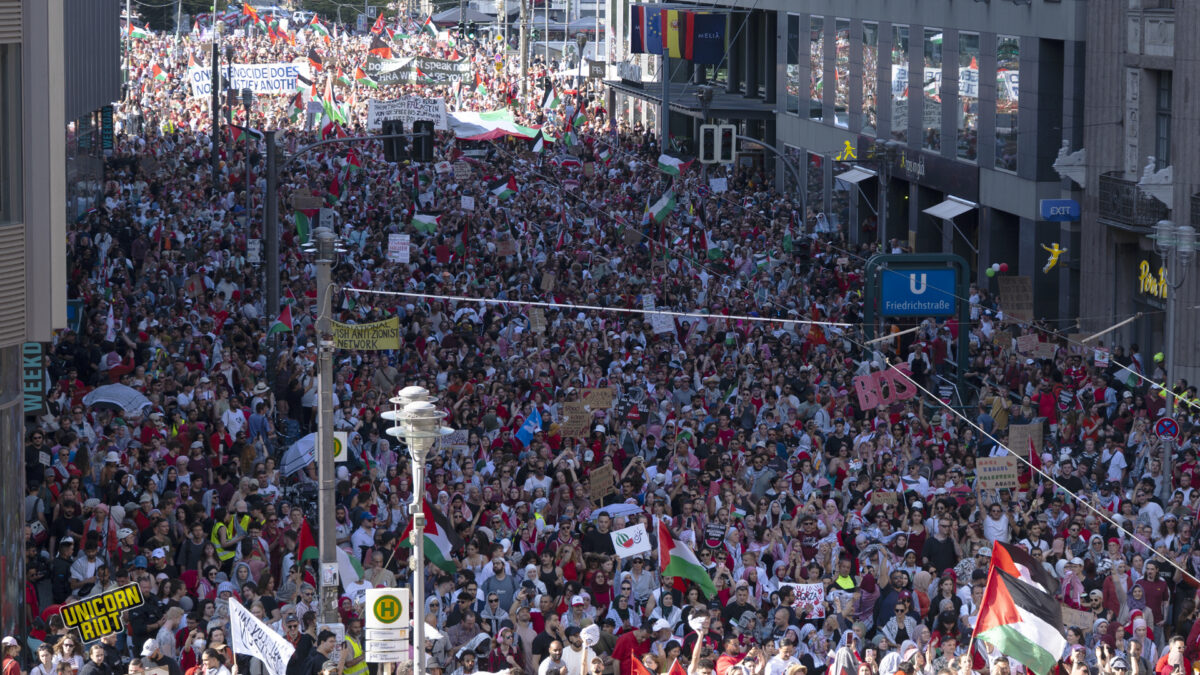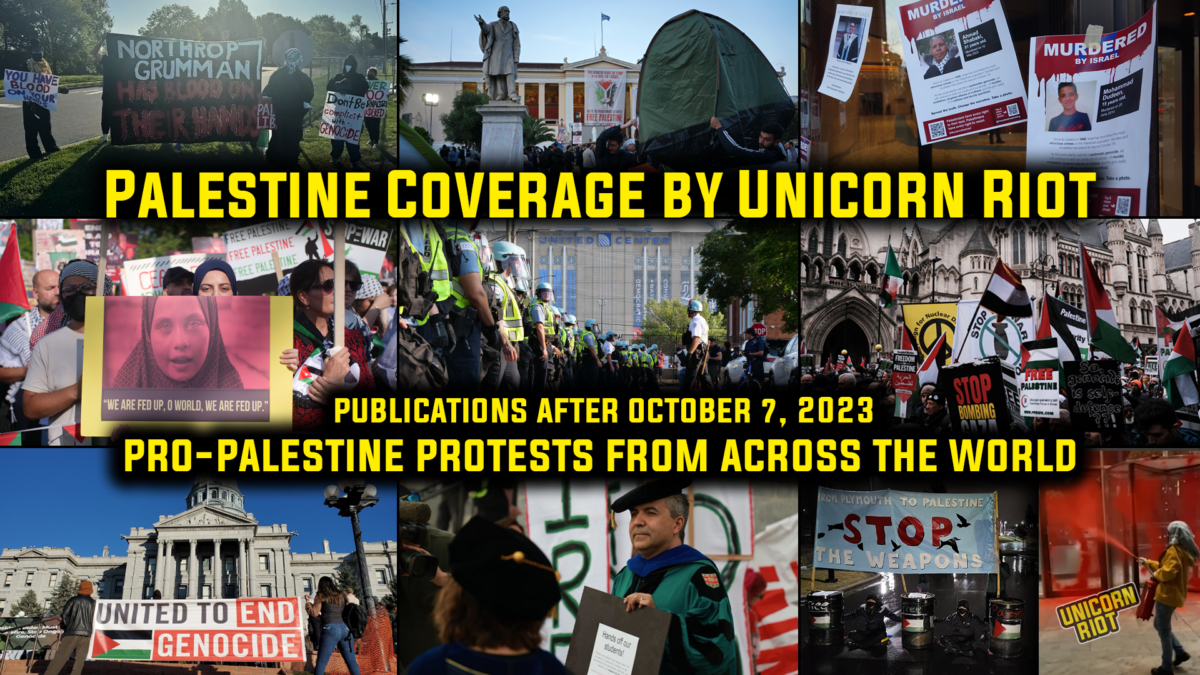Berlin, Germany — Long before October 7, 2023, Palestinians and their supporters in Germany, especially in Berlin, have faced policies of marginalization and severe repression. An ongoing assault on their constitutional rights to free speech, assembly, and expression has intensified since Oct. 7, suppressing the ability to mourn and speak out against Israel’s genocidal actions in Gaza.
In a recently published database titled Index of Repression, the European Legal Support Center (ELSC) and Forensic Architecture have documented 766 incidents of the multifaceted repression against pro-Palestinian voices, spanning from 2019 to April 2025. Arrests, censorship, bans of demonstrations, harassment, surveillance, professional repercussions, sanctions at workplaces and have been deployed systematically against activists, political organizations, journalists, academics, artists, and NGOs by police, state institutions and media. Jewish pro-Palestine voices are also being subjected to sanctions for criticizing the state of Israel.
As the ELSC points out, “repression functions not only to censor but to shape what is acceptable discourse, producing a political reality in which solidarity with Palestine is marked as deviant, dangerous, or outside the bounds of democratic speech.”
This article aims to contextualize some of the situation from the enabling of the repression to highlighting the spectrum and severeness of voices for Palestine being silenced in Germany. We focus on Berlin, where the largest mobilizations, and government crackdowns, have occurred. To begin, we start with a video from the pro-Palestine demonstration on June 21, 2025 in Berlin where we heard from activists, organizers, and a blacklisted journalist, see the video below.
Sections in this report: Palestinians in Germany, The Ideology of Staatsräson/raison d’etat, Repression of Pro-Palestine Protests in Berlin, The Palestine Congress – We accuse!, The Labeling of BDS as Extremist, Social Media Monitoring, Repression in the Educational Sector, Funding Cuts in Cultural Institutions, Weaponizing a Modern Genocide: Germany is Key Arms Exporter to Israel, Press Freedom Under Attack, The Hüseyin Doğru Case, The Next Day for Germany’s Pro-Palestine Movement
Palestinians in Germany
Germany is home to one of the largest Palestinian communities in Europe, with estimates ranging from 100,000 to 300,000 people. Exact numbers are unclear due to Palestinian citizenship not being registered in German statistics. Palestinians are categorized under various labels like refugees, stateless individuals, or by their transit countries (e.g., Lebanon, Syria). Those with Israeli citizenship are registered as Israelis, and others may hold German or other European citizenship.
The capital city of Berlin is home to Germany’s biggest Palestinian population. According to the Bureau of Statistics for Berlin and Brandenburg, the state that surrounds Berlin, the number of Palestinians was determined to be 11,753 in 2013. On the other hand, a 2010 report by Berlin International estimated the number above 30,000. Palestinian organizations go as high as 45,000. This lack of recognition leads to invisibility and perpetuates systemic marginalization.
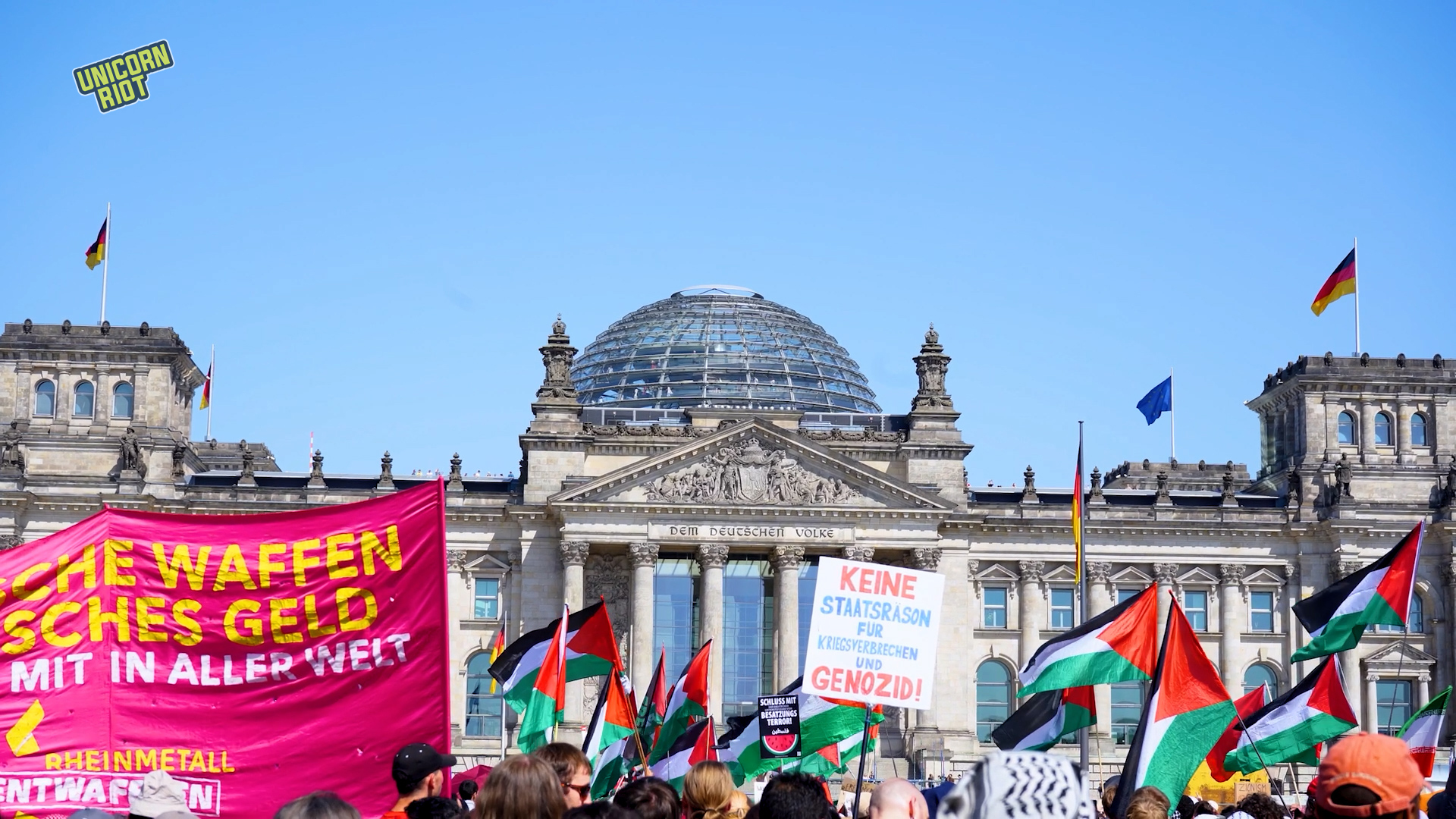 Signs and Palestinian flags are seen during massive pro-Palestine protest on June 21, 2025 outside the Reichstag building in Berlin, Germany
Signs and Palestinian flags are seen during massive pro-Palestine protest on June 21, 2025 outside the Reichstag building in Berlin, Germany
The Ideology of Staatsräson/raison d’état
A key point in understanding the harsh repression of the pro-Palestine movement in Germany — as well as the foundations of current German diplomacy and foreign policy — is grasping the underlying ideology. The concept of Staatsräson refers to the notion that Israel’s security is integral to the fundamental interests of the German state.
The emergence of this concept marked a transformation in Germany’s approach to the lessons of the Holocaust. The German political establishment shifted away from the idea that the Holocaust created a responsibility toward humanity as a whole and instead framed it as a responsibility toward Israel alone.
This shift began with Chancellor Angela Merkel’s 2008 address to the Knesset, Israel’s Parliament, where she first articulated this principle. Following the October 7 attacks on Israel it has been reinforced by her successor, Chancellor Olaf Scholz. Scholz stated, “At this moment, there is only one place for Germany. That is the side of Israel,” emphasizing that “Israel’s security is German ‘reason of state.’”
Supporters of the Staatsräson principle can be found across the whole German political spectrum from the far-right AfD, to the social democratic SPD, the Green Party up to the left and post-autonomous German left. This “Querfront,” an alignment from the far-right to the far-left, legitimizes Germany’s internal and external policies of hostility toward Palestinians.
Opposition to Zionist settler colonialism and genocide is increasingly framed as antisemitism, a designation that has been weaponized to silence pro-Palestinian voices. Palestinian, Arab and Muslim communities, as a whole, are portrayed as inherently violent, antisemitic, and as security threats by nature of their mere existence. German leaders have called on Muslims to publicly “distance themselves from antisemitism.”
A fabricated narrative of imported Arab/Palestinian antisemitism is used to erase Germany’s own history of antisemitism while imposing collective responsibility on already marginalized Arab migrant communities. It ignores and covers up the broader context of rising antisemitic violence perpetrated primarily by the far-right, and it serves as a distraction from the state’s failure to address institutional racism and the antisemitism that persists within German society.
The imported antisemitism narrative has been instrumentalized for stricter migration measures and immigration restrictions. Expressions of support for the Palestinian cause have been used as justification for refusing to renew residency permits and even deport people.
Additionally, the latest draft of Germany’s naturalization laws identifies “antisemitic attitudes” as a basis for exclusion, while also stipulating the recognition of Israel’s right to exist as a prerequisite.
The previous governing chancellor of the social democratic SPD, Olaf Scholz, stated on October 20, 2023, “We have to deport people more often and faster,” aligning fully with the rhetoric and demands of the far-right AfD (Alternative for Germany) Party, which has gained big momentum in Germany in recent years.
Antizionist Jewish groups clearly state that what makes them unsafe are right-wing politicians and Nazis increasing their power in the German Parliament, the collaboration of police, military, and the far-right, the structural and cultural racism within German institutions, and the externalization of blame for antisemitism to racialized communities.
Rachael Shapiro, a member of the International Jewish Anti-Zionist Network, whose grandmother was a Holocaust survivor, believes that “Germans are the most prolific antisemites the world has ever seen” and are using the “false equation of Zionism and Judaism” to criminalize others.
“Germany and Germans are the most prolific antisemites the world has ever seen. They are now claiming that Muslims and Arabs and in particular Palestinians have brought antisemitism to Germany, to the country that killed six million Jewish people (…) They treat Jewish people as terribly as they always have. They use this false equation of Zionism and Judaism, in order to further oppress and criminalize other groups of people. Germany is no stranger to the dehumanization of other groups, in order to perpetuate war crimes against them. They continue to be antisemitic through this equation.”
Rachael Shapiro, member of the International Jewish Anti-Zionist Network.
Repression of Pro-Palestine Protests in Berlin
Berlin authorities had already revealed their intentions by banning the Nakba commemorations in 2022 and 2023. Since October 2023, their response to Palestinian solidarity protests has been marked by harsh repression, including protest bans and aggressive policing.
On October 9, 2023, Berlin Police imposed a week-long ban on Palestinian solidarity demonstrations that was extended until October 27. Between October 11 and 20, ELSC reported 600 detentions in Berlin, including minors, alongside numerous criminal and administrative cases.
As the Campaign for Victims of Racist Police Violence (KOP) has highlighted, there are numerous videos documenting police brutality, including the use of pepper spray, police dogs, and physical force, causing multiple injuries. Minors were among the arrested just for bearing the Palestinian flag, or chanting “Free Palestine.”
The Ministry of the Interior designated the slogan “From the river to the sea, Palestine will be free” as an expression of support for Hamas, alongside other symbols.
In multiple cases over the past 22 months, German police have banned the use of Arabic language in protests, confiscated literature and criminalized chanting slogans, the dancing of traditional Palestinian dances and the bearing of cultural symbols such as the keffiyeh.
At the large Berlin demo in June 2025, Amira, a Palestinian activist, told Unicorn Riot that she’s experienced “too many incidents” of repression to mention, “every protest ended violently.” She said she spent endless nights doing jail support or “waiting at the hospitals for comrades to receive treatment. I have friends whose homes got raided because of social media posts.”
This criminalization has exceeded the framework of protests and has been normalized in many working-class Muslim districts like Berlin-Neukölln, home to the largest Palestinian community in Berlin. Constructing the figure of the young, angry, emotional and violent Arab Muslim, the German state and police practically occupied the already over-policed Neukölln for several weeks to prevent protests right after October 7, 2023.
 Large groups of police were seen on the outside of the massive pro-Palestine protest on June 21, 2025 in Berlin, Germany
Large groups of police were seen on the outside of the massive pro-Palestine protest on June 21, 2025 in Berlin, Germany
The Palestine Congress – We accuse!
A three-day Palestine Congress held in Berlin in April 2024 was supposed to serve as a tribunal to denounce the mass destruction of Gaza and its population by the state of Israel, expose the role that the German state plays, and mobilize for human rights under the banner of “Never Again” for all.
The event was heavily policed and demonized across German media and politics. Headlines labeled it an “Israel-hater congress” despite Jewish groups co-organizing the events. Ahead of the Congress, the homes of organizers were raided by the Berlin police and the German state froze the bank account of the organization Jewish Voice for a Just Peace in the Middle East.
Prior to the Congress, entry bans were given to former Greek Finance Minister Yanis Varoufakis, now leader of the European party Diem25, and British-Palestinian writer Salman Ghassan Abu Sittah. Both were also banned from all political activities in Germany, including via Zoom.
On the first day of the Congress, April 12, approximately 2,500 police officers in riot gear raided the venue, cut off electricity and arrested several organizers and attendees. The police then issued bans on the final two days. On the next day, police attacked people protesting the Palestine Congress ban.
Days after the event, Berlin resident Udi Raz, an Israeli who helped organize the Congress, lost his job for referring to Israel as “apartheid” and has since been branded an antisemite by German mainstream media.
The Labeling of BDS as Extremist
Germany’s crackdown on Palestine solidarity activism reached a new level on June 18, 2024, when the main intelligence agency Verfassungsschutz announced that the Boycott, Divestment and Sanctions (BDS) movement was under suspicion of being an “extremist group.”
The Constitutional Protection Report (PDF) claims that BDS is a movement characterised by anti-Israel positions and statements, “and the structures and followers and supporters that can be attributed to it are related to secular Palestinian extremism.”
The intentions of the German state towards the BDS movement have been clear since 2019, when the German parliament labeled the BDS movement as antisemitic, the only country in the EU to do so.
Social Media Monitoring
Social media in Germany has become a focal point for policing and criminalizing pro-Palestinian and anti-colonial sentiment. The German government has intensified efforts to monitor and punish social media activity linked to Palestine solidarity.
Multiple cases of house raids and arrests of people have been documented for using slogans like “From the River to the Sea” and, in general, for expressing support for Palestine online, even through a “like.”
Following events like the Palestine Congress, authorities investigated speakers based on their social media posts. In addition, segments of German civil society are complicit in this digital policing by engaging in personal denunciations and archiving posts critical of Israeli policies.
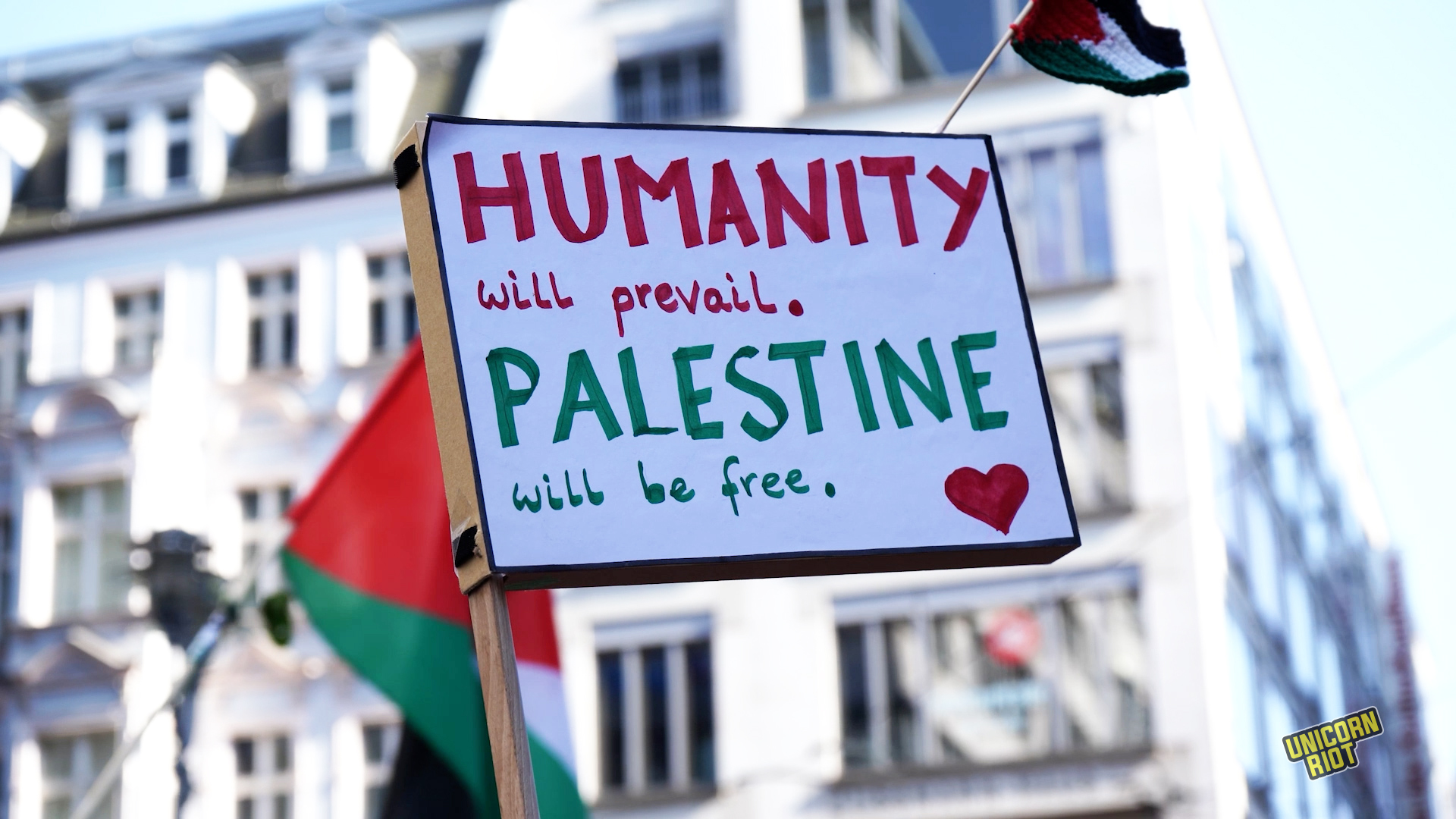 Sign reading “Humanity will prevail. Palestine will be free.” is seen during massive pro-Palestine protest on June 21, 2025 in Berlin, Germany
Sign reading “Humanity will prevail. Palestine will be free.” is seen during massive pro-Palestine protest on June 21, 2025 in Berlin, Germany
Repression in the Educational Sector
Germany’s crackdown on Palestinian solidarity has affected academic institutions, silencing dissent and targeting students and academics.
Protests have been repressed, events and lectures critical of Israeli policy cancelled, smear campaigns against conferences and academics have been organized, and internal investigations against academics were put in effect. Actors were university administrations, police and media alleging “antisemitism,” ”lack of neutrality,” or “breach of policy.”
On May 7, 2024, 100 students gathered on the campus of the Free University Berlin and erected tents to create a protest camp, joining the international students’ encampment movement. The university administration informed the police immediately, who came and violently evacuated the camp brutally detaining activists that participated.
In response to this repression a “statement by lecturers at Berlin universities” was published signed by over 1,000 academics in support of the protesting students and calling on administrators “to refrain from deploying the police against their own students, as well as from pursuing further criminal prosecution.”
Leaked internal emails from the Education Ministry in June 2024, show that the former minister of Education and Research requested a criminal investigation into the letter and an assessment to gauge the ability to withdraw the university’s funding over the open letter.
Amira, a former student herself, chose to quit her studies after getting detained and fined by her own university for participating in a pro-Palestine lecture hall occupation in November 2023. “I didn’t feel like going there anymore, to be honest.”
Inside the schools, policies have further marginalized Palestinian identity and repressed pro-Palestine voices. In October 2023, a directive was issued allowing schools to ban Palestinian symbols such as the keffiyeh and “Free Palestine” badges.
A teacher in Berlin hit a student for displaying the Palestine flag at school on October 9, 2023. The student was then expelled and the police brutally dispersed a solidarity protest.
The German parliament adopted a resolution (pdf) earlier this year against “antisemitism in schools and universities” that provides for sanctions such as suspension or expulsion for antisemitic behavior in educational institutions.
In February 2024, the Social Democratic Party (SPD) and the Christian Democratic Union (CDU) in Berlin decided to distribute the brochure “Mythos #Israel 1948,” in which the Nakba (the mass displacement and ethnic cleansing of Palestinians) is described as a “myth” in high schools. After backlash the decision was revoked.
“Imagine being a kid from Palestine,” said Amira, “growing up with the stories how your grandparents got expulse, how your parents lost houses, how family members have lived through violence and then some German politicians come and want to make you believe that all this never happened. This is the denial of genocide, that is also part of committing genocide.”
Funding Cuts in Cultural Institutions
In the cultural sector, access to venues has been withdrawn, events cancelled, smear campaigns organized, threats of defunding were made and defunding was implemented against pro-Palestine artists and institutions. For example, Berlin’s Oyoun cultural center lost financial support after hosting an event with Jewish Voice for a Just Peace in the Middle East.
The trend of bureaucratic repression has also extended to social centers, as evidenced by the closure of two youth centers that served only migrant and queer youth, Alia and Phantalisa. The reason for the closures was the content of personal Instagram posts of some of the center’s staff and program coordinators, their participation in pro-Palestine demonstrations, and that one of the youth workers was scheduled to speak at the Palestine Congress.
In a statement about their closure, organisers at FRIEDA-Frauen*Zentrum e.V, the organization responsible for the two centers, wrote they were shocked “about the spying on employees‘ private Instagram accounts … we have fallen victim to the pattern of repression and intimidation … that is currently affecting people who show solidarity with the Palestinian people.”
In a new case, in April 2025 German festivals canceled the concerts of Irish band Kneecap, which is being targeted and silenced for their pro-Palestine, anti-Israel stance.
Not all of the push against pro-Palestinian voices has been successful. Workers were able to reverse a change in new funding practices by the Berlin Senate Cultural Administration last year. Applicants of grant money had to sign an “anti discrimination clause” which defined criticism of Israeli policies as antisemitic – the clause was dropped in the same month due to pressure from cultural workers.
Weaponizing a Modern Genocide: Germany is Key Arms Exporter to Israel
Since 2003, Germany has authorized 4,427 individual arms export licenses to Israel, with a combined value of approximately 3.3 billion euros. According to a Forensic Architecture report (pdf), in 2023, Germany approved arms exports to Israel totaling 326.5 million euros ($354 million). This accounted for 47% of Israel’s military supplies, with Germany being the second-largest supplier of arms to Israel, following the United States. This is a tenfold increase from 2022. 99% of Israel’s arms are sourced from the U.S. and Germany (pdf).
As early as January 2024, the International Court of Justice (ICJ) ruled that there is a “plausible” risk of genocide of the Palestinian people in Gaza.
In February 2024, UN experts stated that “any transfer of weapons or ammunition to Israel that would be used in Gaza is likely to violate international humanitarian law (IHL) and must cease immediately.”
The ICJ ruling, the UN declarations, and the civil society pressure built by the global pro-Palestine movement have had a slow, but visible, effect on the international arms transfers to Israel. Several countries, including Belgium, the Netherlands, Spain, Colombia, Japan and Canada have taken steps to suspend export licences and halt military exports to and imports from Israel, either entirely or for specific weapons.
This was not the case for Germany despite several legal actions, lawsuits and criminal complaints undertaken to prevent Germany from arming Israel. The ICJ itself, despite its earlier ruling, rejected Nicaragua’s application to indicate provisional measures against Germany to halt military aid to Israel.
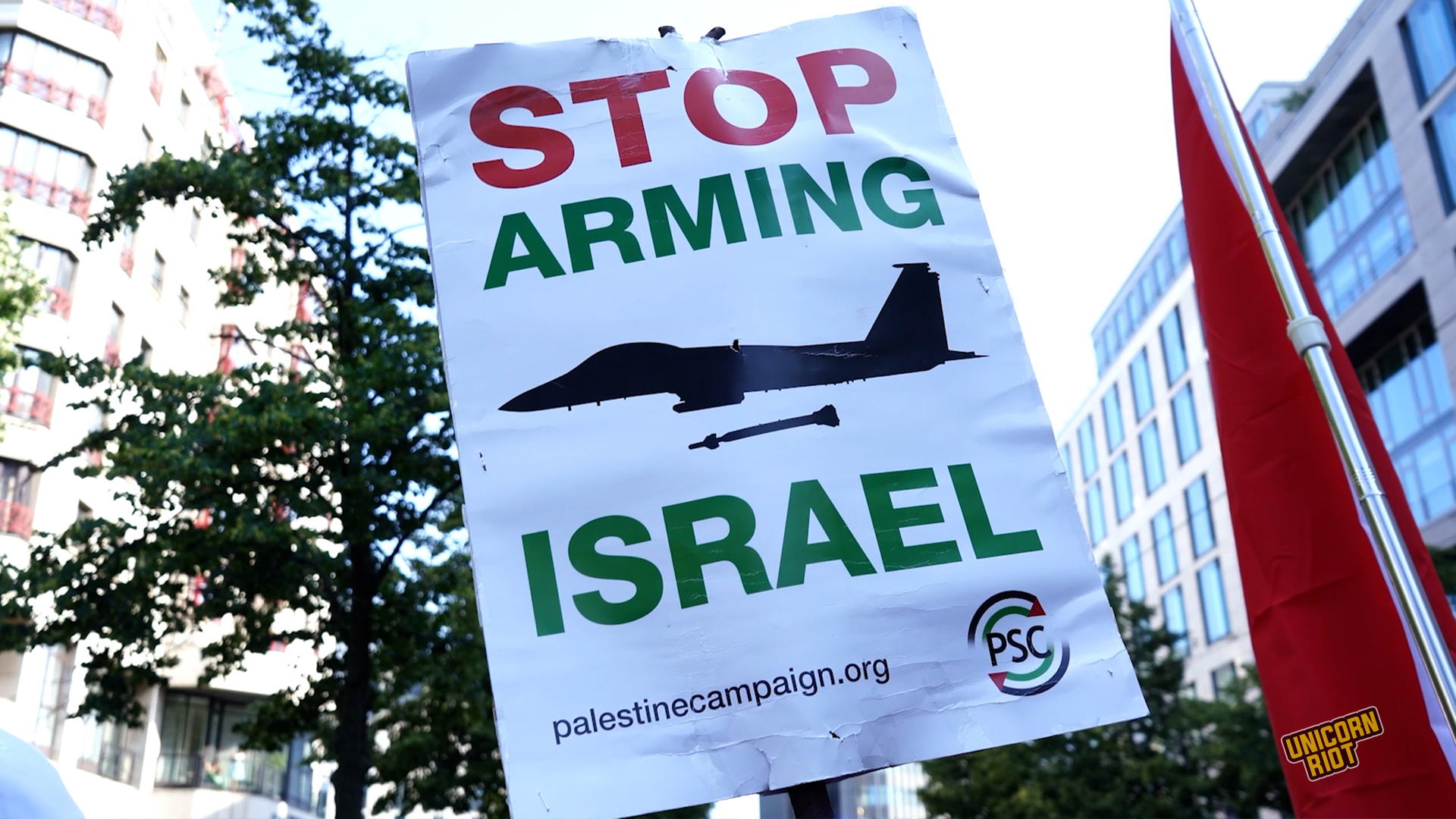 “Stop Arming Israel” sign seen during a massive pro-Palestine protest on June 21, 2025 in Berlin, Germany
“Stop Arming Israel” sign seen during a massive pro-Palestine protest on June 21, 2025 in Berlin, Germany
Press Freedom Under Attack
As documented in the Index of Repression database, 81 incidents of the total 766 have been against media and journalists. These include disinformation/smear campaigns against pro-Palestine journalists, artists, activists, organizations and events orchestrated by major German news platforms alleging antisemitism and support of terrorism.
In addition, 20 cases of targeted attacks on journalists are documented, including police investigations against journalists, firings of journalists, political bans of journalists, and detentions of journalists at demonstrations because of their pro-Palestine stance.
On the other hand, the 2024 and 2025 press freedom reports of Germany by Reporters Without Borders (Reporters sans frontières; RSF) highlight the emerging of a new trend, attacks on journalists “perpetrated by demonstrators against the war in Gaza.” They locate 49 cases in 2024 in Berlin “on the sideline of Middle East-related demonstrations.”
Professionals in the media sector responded to the RSF reports with a signed open letter to RSF International criticizing them that the “report does not question German institutions for their wrongdoings – imposing censorship and media bias – while it proposes one main, distorted from the reality, conclusion: that pro-Palestine protesters are posing a threat to the freedom of the press in Germany.”
They claim that the report does not take into consideration the influence of Germany’s Staatsräson on news reporting and neglect the reporting of violations from independent journalists covering the pro-Palestine events. The report prioritizes the perspectives of journalists that abide by Staatsräson policies, they say, many who are known to have violated journalistic ethics and work for media organizations that display biased editorial policies motivated by their economic investments.
The Hüseyin Doğru Case
The most severe case of repression against a journalist in Germany, not by the German state itself but by the EU, is the case of Hüseyin Doğru.
Dogru worked in the past for the media outlet Redfish, which was financed by Russian news agency Ruptly (Ruptly is owned by RT, which is funded by the Russian government). Redfish was one of the first media outlets to be labeled as Russian-state affiliated media shortly after the invasion of Russia in Ukraine in 2022 and was banned from YouTube and all Meta platforms.
After that, Dogru founded an independent media organization by the name of Red.media. The coverage of Red. focused primarily on Israel’s genocidal actions and the German state’s crackdown on pro-Palestine mobilizations, as well as German complicity in the war.
Red. was targeted from the very beginning, without clear evidence presented, through media smear campaigns, through disinformation as a strategy of delegitimization alleging antisemitism, support of terrorism and ongoing Russian ties.
Former Secretary of State Anthony Blinken accused Red. in a press conference in Sept. 2024 as a direct successor to Redfish, claiming “RT covertly runs” it. This led to the EU Commission imposing sanctions on Doğru, a German citizen, on May 20, 2025. Immediately Red.media announced its closure.
The sanctions were imposed in the context of the Russia sanctions package. The EU claims on the one hand that Doğru’s previous work indicates ongoing structural and financial ties with the Russian state and on the other hand, the EU argues that the coverage of Palestinian issues by Red. is fueling misinformation and social distortion that only Russia can benefit from.
As Doğru points out to Unicorn Riot:
“What everyone thinks is accounts being frozen and maybe a travel ban, which I have as well. But it goes further. I am not allowed to buy food, I am not allowed to buy water, I am not allowed to buy medicine. Any money exchange is forbidden for me.”
For Doğru, the EU sanctions imposed on him are “setting a precedent right now, where journalism itself right now can be sanctioned, can be criminalized and punished if it does not serve the benefits of the imperialists, in this case Germany and the European Union.”
He concluded: “I’m going to fight these sanctions, because these sanctions are illegal, they are extrajudicial, there was no court, there was no hearing, there was no sentencing.”
The Next Day for Germany’s Pro-Palestine Movement
The German elections of February 2025 brought the Christian Democratic Party (CDU) to power. It is important to highlight that the German Staatsräson regarding Israel is supported across the entire spectrum of parties in the newly elected German parliament. Even the left-wing party Die Linke, with the exception of a few members, cannot clearly distance itself from Staatsräson policies. As a result, the pro-Palestinian movement cannot expect to find parliamentary allies after the 2025 elections.
Friedrich Merz, the new German chancellor, reaffirmed Germany’s unwavering support for Israel by inviting Netanyahu to Germany despite the ICC warrant, promising he wouldn’t be arrested. However, in May 2025, Merz unexpectedly criticized Israel’s actions in Gaza, saying their operations could no longer be justified. Weeks later, as Israel struck Iran, he called it “the dirty work Israel is doing for all of us.”
These mixed signals come amid growing global condemnation of Israel’s aid blockade tactics and civilian deaths, as well as a shifting public mood in Germany — 73% now support limiting arms exports, and 30% want them stopped entirely. Without concrete action to halt arms transfers, Merz’s criticism remains a communication tactic.
The Palestinian communities, organizations and activists have survived a severe crackdown by the German state over the past 22 months. Through a steadfast conviction, up to 60,000 people marched in Berlin on June 21, 2025, in the biggest demonstration in solidarity with Palestine ever in the country.
“This is a global movement,” said Rachael Shapiro to UR. “This is a global shift in consciousness and we are here to say we will never go back, there is no going back. Gaza has changed the world, it has changed all of us and we will be here to hold Germany and the entire West accountable for their war crimes.”
Germany “normalizes” the genocide in Gaza, said Amira. “Germany has made itself a fool in front of the international community. It came to the point that genocide cannot be denied and the narrative is slowly shifting.”
“Palestinians have been fighting colonization not only for the past 77 years, but also before, it was the Ottoman Empire, the British Mandate and Palestinians pushed through, Palestinians preserved their culture, preserved their heritage and they never stopped fighting for self determination. Where unspeakable horrors are happening, there is also hope.”
For more coverage of pro-Palestine protests since October 2023, click here or the image below.
Follow us on X (aka Twitter), Facebook, YouTube, Vimeo, Instagram, Mastodon, Threads, BlueSky and Patreon.
Please consider a tax-deductible donation to help sustain our horizontally-organized, non-profit media organization:

